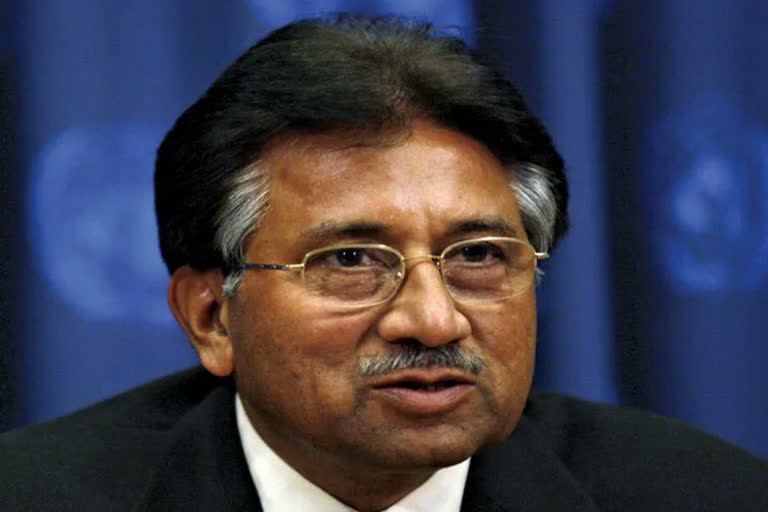Islamabad: Pakistan's former military dictator General Pervez Musharraf, the architect of the Kargil War, toppled the democratically-elected government in a bloodless military coup in 1999 and ruled the country for nine years with an iron fist during which he also tried to project himself as a progressive Muslim leader. Born in a middle-class family of Urdu-speaking Mohajir parents in Delhi, Musharraf later migrated to Pakistan after the Partition in 1947. He spent his final years in self-exile in the UAE battling a rare disease. He died in the Gulf country after a prolonged illness on Sunday.
The 79-year-old retired general was the main architect of the Kargil War that took place months after then Prime Minister Nawaz Sharif signed a historic peace accord with his Indian counterpart Atal Bihari Vajpayee in Lahore. After his failed misadventure in Kargil, Musharraf deposed the then Prime Minister Sharif in a bloodless coup in 1999 and ruled Pakistan from 1999 to 2008 in various positions first as the chief executive of Pakistan and later as the President.
Musharraf, who announced elections in 2008 under domestic and international pressure, was forced to resign as president following the polls and went into self-imposed exile in Dubai. In 2010, he formed his own party, All Pakistan Muslim League and declared himself as the party President. He voiced his opinion of actively taking part in Pakistan's politics sometime in the future.
He returned to Pakistan in March 2013 to contest polls after living in self-exile for about five years, but was hauled to court in different cases - including the 2007 assassination of former premier Benazir Bhutto, treason under article 6 of Pakistan constitution and murder of Bugti tribe chief Nawab Akbar Khan Bugti.
In 2006, on the orders of Gen Musharraf, the Pakistan Army killed former junior interior minister and Governor of Balochistan Bugti and over two dozen of his tribesmen, leading to widespread unrest in the area and a surge in the Baloch nationalist sentiment in the province bordering Iran, Afghanistan and the Arabian Sea with strategically important port of Gwadar.
In 2019, Musharraf was sentenced to death in absentia by a special court which found him guilty of high treason, for imposing a state of emergency on November 3, 2007, by keeping the Constitution in abeyance. The judgement angered the country's powerful Army that has ruled over Pakistan for most the period since its existence. It was the first time a former top military official had faced such a sentence for treason in Pakistan. The death sentence was later annulled by the Lahore High Court.
Musharraf, who was living in Dubai since March 2016, was also declared a fugitive in Benazir Bhutto murder case and Red Mosque cleric killing case. During his tenure, Pakistan saw some structural reforms - ranging from economic and social sector to administrative and political restructuring. Musharraf allied with America in the war against terror after the 9/11 attacks on the US.
He cracked down on Islamist groups and banned dozens of radical outfits, in an effort to project himself as a moderate and progressive Muslim leader. However, his move angered radicals and he even escaped assassination attempts in later years. Musharraf had visited India for the failed Agra summit in 2001 and made two more visits in 2005 as President to watch an India-Pakistan One-day Cricket match and in 2009 to attend a media event after shedding power.
Musharraf, the second of three brothers, was born in Delhi on August 11, 1943. He spent his early years in Turkey, from 1949 to 1956, as his father Syed Musharrafu-ud-din was posted in Ankara. On his return from Turkey, Musharraf studied at Saint Patrick's High School, Karachi, and then from F. C. College, Lahore. He joined the Pakistan Military Academy in 1961 and was commissioned in the Artillery Regiment in 1964.
He fought in the Indo-Pakistan War of 1965 as a young officer, and also participated in the Indo-Pak War of 1971 as a Company Commander in the Commando Battalion. Musharraf rose to the rank of General and was appointed as the Chief of Army Staff on October 7, 1998 by then prime minister Sharif.
He was given additional charge of Chairman Joint Chiefs Staff Committee on April 9, 1999. Six months later, he toppled the Sharif government and became the head of the state designated as Chief Executive. Musharraf got married in 1968 and has two children, a son and a daughter. (PTI)
